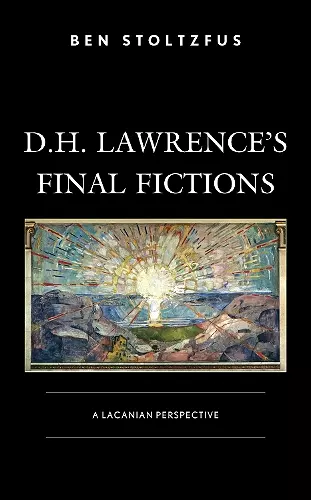D.H. Lawrence’s Final Fictions
A Lacanian Perspective
Format:Hardback
Publisher:Lexington Books
Published:28th Jun '22
Currently unavailable, and unfortunately no date known when it will be back

D.H. Lawrence’s Final Fictions: A Lacanian Perspective explores how literature thinks; more specifically, how the reading of fiction influences behavior. Lawrence writes passionately about our alienation from ourselves, from other people, and from the cosmos. He believes that we need to heed the voices of our unconscious, and he shows us how to meld body and mind so that, psychoanalytically speaking, Id and Ego can come together. In this endeavor there is a salient convergence between Lawrence's writings and those of Jacques Lacan, the French psychoanalyst.
In this book, Stoltzfus examines the poetics of seven major fictions that Lawrence wrote between 1925 and 1930, five productive years that are referred to as his fabulation period. In each of the book's seven chapters, in tandem with Lacan's writings, Stoltzfus analyzes seven major characters, four of whom move from alienation to the renewal of self and the cosmos. He argues that Lawrence's fiction is simultaneously descriptive and prescriptive by showing us how to circumvent dysfunction. Stoltzfus brings literature and psychoanalysis together in readings that are both aesthetic and epistemological. They are recipes for curing the Anthropocene.
Ben Stoltzfus’s Lacanian study of five stories and two novellas from late in Lawrence’s career demonstrates that contemporary critical theory can bring fresh illumination to a classic modernist. Stoltzfus’s readings of the seven fictions trace a progression from malady to remedy, an encouraging pattern for our troubled times. D. H. Lawrence – effectively reinforced by Lacan – emerges once again as a visionary writer with a compelling message of harmony and balance.
-- Keith Cushman, University of North Carolina at GreensboroThis book gracefully connects the four subjects in its title: Lawrence, Lacan, the Anthropocene and the short story. The author’s clear exposition makes Lacanian theory accessible to the psychoanalytic novice. In his trenchant summary of twentieth-century intellectual history, Stoltzfus places Lawrence in a global historical context. Lawrence’s prophecy of our doomed world has come true; his cure is needed now more than ever. Stoltzfus sensitively responds to other critics’ readings, especially those of Lawrence’s detractors. He resurrects Lawrence from critical misreadings that may arise from projective identifications that negatively misconstrue the author’s intent. The Introduction could stand alone as a paean to literary modernism. With elegant simplicity Stoltzfus describes our current inability to concentrate, connect with others, or halt our destruction of the conditions needed to sustain life on the planet. Adroitly applying Lacanian theory, Stoltzfus performs close readings that are as apt as they are playful. Comparing Lawrence’s writing method to Hemingway’s and Camus’s unveils the secret of making a powerful short story. To read Stoltzfus is to remember why we loved Lawrence in the first place.
-- Jill Franks, University of Massachusetts AmherstIn this exciting new book, the polymath Ben Stoltzfus amazes us yet again with his audaciously imaginative approach to literary arts, calling this book “an exploration of how literature thinks” (!) This “exploration” focuses on D. H. Lawrence’s “reinvention of the language of fiction.” Stoltzfus shows how, in these late stories, Lawrence joined conscious artifices like plot and character to linguistic figures (“gaps, puns, repetitions, metaphorical slippages, and homonyms”) charged by their impulsion from the unconscious. This linkage creates a climacteric space where “desire lurks” instead of remaining submerged, a la Hemingway’s “iceberg” theory of writing. While Lawrence rejected Freud’s unconscious (especially his incest taboo) and says he deduced his own version of the unconscious from “novels and poems,” Stoltzfus nonetheless finds a Laurentian affinity with Lacan’s own unique reading of Freud’s theories.
Stoltzfus’ scholarship is meticulous and never pedantic. His deep and abiding concern for the widest cultural/historical implications of literary works is joined with his unparalleled ability for exposition of some of the most complex psychoanalytic thinking.
-- Juliet Flower MacCannell, University of California, IrISBN: 9781666903676
Dimensions: unknown
Weight: unknown
184 pages